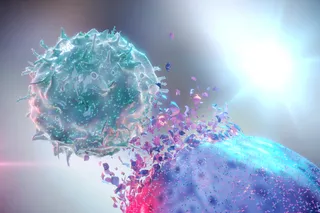A simple urine test is being developed that would revolutionize the treatment of prostate cancer by differentiating between the benign and aggressive forms of the disease. While prostate cancer is one of the most commonly diagnosed cancers in men, the real challenge for treatment tends to lie in measuring the progress of the disease. A person can live a long time with benign prostate cancer, but the aggressive kind of tumor grows much more quickly and requires urgent treatment. The current method for distinguishing between the two can involve several rounds of testing, including an invasive and painful biopsy. The urine test, which will not be ready for at least another three to five years, would be an easy and inexpensive way to determine which type of cancer is present, researchers report in Nature [subscription required]. Research for the test began when doctors found that men with an aggressive form ...
In a Few Years, Men Could Pee in a Cup to Diagnose Prostate Cancer
Discover how a urine test for prostate cancer can differentiate between benign and aggressive forms, revolutionizing treatment.
More on Discover
Stay Curious
SubscribeTo The Magazine
Save up to 40% off the cover price when you subscribe to Discover magazine.
Subscribe













